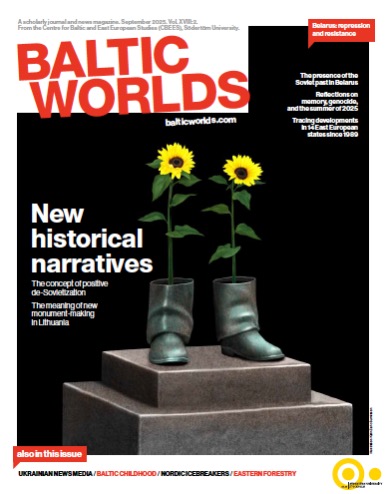Alexandra Biktimirova and Victoria Kravtsova
Alexandra Biktimirova is a student at the HSE University in Moscow and a feminist activist. Research interests center on the intersections of feminism and Islam in the Volga-Ural region in Russia, as well as globally. Coordinated the exhibition Feminist Translocalities in Kazan in 2020. Research interests are gender, muslim women, and relationships between discourses of power and marginality.
Victoria Kravtsova is a Feminist researcher, NGO-worker and activist. Born in Smolensk, Russia. Initiated Feminist Translocalities – a queer feminist network between the former USSR, Germany, and sometimes other locales, as wel l as a platform for supporting projects – publications, exhibitions, seminars, podcasts etc. Research interests include the intersections of feminist, antiracist and decolonial struggles in the countries of the former USSR.
view all contributors
Articles by Alexandra Biktimirova and Victoria Kravtsova
-
Nearly three decades after the end of the war in Bosnia and Herzegovina, thousands of people are missing and mass graves are regularly found. Relatives still search for knowledge about their loved ones in the midst of secrets, rumors and ethnonationalist denial. As the country struggles to come to terms with this dark legacy of the war, art has emerged as a space for recognition of the lingering presence of absence of the missing.
-
Call for Abstracts (until January 31, 2024) for the Special Issue of Baltic Worlds "Sounds in times of war. Popular Music, (contentious) politics and social change since Russia's war on Ukraine"
-
Current research tell us that we are presently facing a global wave of autocratization. Gradual declines of democratic attributes characaterize political regimes worldwide. Technology opens up for democratic interaction, but also makes it easy to spread fake news. Freedom of expression is in peril. Universities all around the world encounter repression of academic freedom. To discuss these and other challenges, Linnaeus University (in Växjö) organized a digital conference on A Questioned Democracy, on November 15, 2023.
-
On November 7-8, 2023, Baltic University Programme organized the BUP Symposium, an annual online event to discuss different aspects of ongoing research on sustainable development in the Baltic Sea region.
-
Shortly after the outbreak of the war (the full-scale Russian attack on February 24, 2022), the European Commission set up a fellowship scheme (called MSCA4Ukraine) to provide support to displaced researchers from Ukraine.
-
Gefjon Off, Contested Feminism: Backlash and the Radical Right (Department of Political Science, University of Gothenburg, September 15, 2023): Public defense of doctoral dissertation. External opponent: Professor Elisabeth Ivarsflaten, Department of Government, University of Bergen.
-
Public defense of doctoral dissertation: Roman Privalov, After Space Utopia: Post-Soviet Russia and Futures in Space (Södertörn University, School of Social Sciences, May 12, 2023), 210 pages. External opponent: Associate Professor Arita Holmberg, Swedish Defence University, Stockholm.
-
For two days in early June, a team of researchers met up at Södertörn University (CBEES) to discuss different aspects of political participation and political representation of ethnic minorities and migrants in Central and Eastern Europe.
-
Building mutual trust was for years one of the desired aims of international cooperation in the Nordic region; the existence of trust was intended to contribute to the reduction of political tensions and lead to more sustainable and peaceful region. In practice, working with international cooperation in the Nordic region, where Russia was one of the actors until 2022, has never been easy. One of the main obstacles on the way was the deficit of trust.
-
Radical right parties (RRPs) have been extensively studied throughout the past two decades. One neglected aspect is the youth organizations (YOs) of RRPs and their transnational networks. This article analyzes the transnational links between the YOs of RRPs in Estonia and Latvia. The article contributes to the literature by arguing for four findings relating to the transnational links between the YOs of RRPs, which provide a window into the future of the parties being analyzed.
-

 Issue 2025, 2:
Issue 2025, 2: